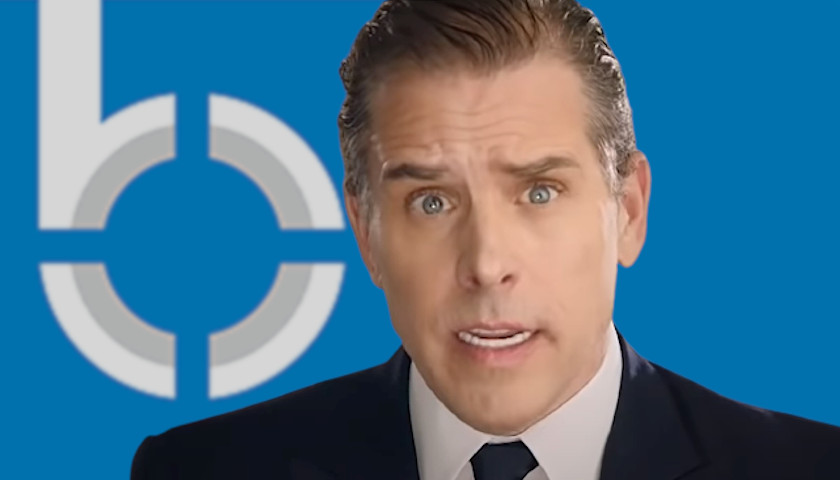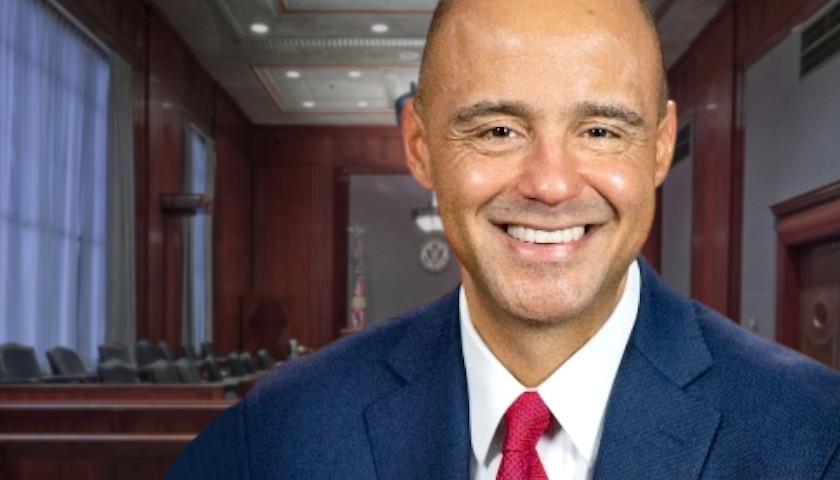by Chuck Ross
A top foreign policy think tank in Washington, D.C. rejected warnings from a Ukrainian anti-corruption activist against forming a partnership with Burisma Holdings, the energy firm linked to Hunter Biden that has faced allegations of corruption.
 Daria Kaleniuk, the executive director of a Ukrainian group called the Anti-Corruption Action Centre (AntAC), contacted John Herbst, a director at the Atlantic Council’s Eurasia Center, on Jan. 20, 2017, and asked him to reconsider plans to work with Burisma, newly released State Department emails show.
Daria Kaleniuk, the executive director of a Ukrainian group called the Anti-Corruption Action Centre (AntAC), contacted John Herbst, a director at the Atlantic Council’s Eurasia Center, on Jan. 20, 2017, and asked him to reconsider plans to work with Burisma, newly released State Department emails show.
Kaleniuk alleged that Burisma was using the Atlantic Council to “clear up its reputation” following bribery investigations into the firm and its owner, Mykola Zlochevsky.
The activist said the Atlantic Council’s partnership with Zlochevsky “is a very painful backblow for us, and … for many other good people in Ukraine who strive for reforms.”
Kaleniuk forwarded the emails she sent to Herbst to State Department officials. The documents were published by the agency in response to Freedom of Information Act requests.
Burisma announced its partnership with the Atlantic Council on Jan. 19, 2017. In its press release, Burisma hyped the Atlantic Council’s prominence in the think tank world.
Burisma called the council “one of the top U.S. think tanks” and a “high-profile organization.” Herbst, who served as U.S. ambassador to Ukraine from 2003 to 2006, was referred to as a “respected diplomat.”
The think tank boasts a deep roster of former U.S. military leaders and government officials. Herbst is one of numerous diplomats who serve as advisers or directors to the Atlantic Council.
Burisma ultimately gave the Atlantic Council $100,000 a year from 2017 to 2019, a spokesman for the think tank told the Daily Caller News Foundation.
As part of the partnership, the Atlantic Council and Burisma hosted several events together in Washington, New York and Kiev.
A spokesman for the Atlantic Council told the DCNF this week that the think tank “took into consideration a number of factors before agreeing to a partnership” with Burisma.
“All financial support for the Atlantic Council — including the past support from Burisma — is strictly conditional on acceptance of the Council’s intellectual independence,” said Alex Kisling.
He also said the funding allowed the Atlantic Council to expose Russian disinformation efforts related to Ukraine, to focus on Ukrainian energy independence, and advance “US-Ukrainian business cooperation.”
Burisma’s relationship with the Atlantic Council was part of a public relations campaign that the firm began shortly after the Maidan revolution, in which Ukrainian President Viktor Yanukovych was forced to flee the country.
Zlochevsky, the Burisma owner, had served in Yanukovych’s administration, and also left Ukraine after the revolution.
Burisma brought several high profile Europeans and Americans onto its board of directors, including Aleksander Kwaśniewski, the former president of Poland, and Cofer Black, a former top CIA official.
Hunter Biden was recruited as a director in May 2014 despite having no experience in the Ukrainian gas industry. Republicans have alleged that Biden’s chief qualification for the Burisma spot, which paid more than $80,000 per month, was that his father served as the Obama administration’s chief liaison to Ukraine following its revolution.
Emails from Hunter Biden’s laptop obtained by the DCNF show that he sought out international business deals for Burisma in Mexico, China and other countries.
Other emails sent to Biden show that he was directly involved in pairing Burisma up with an American consulting firm founded by two Atlantic Council board members.
According to the emails, Burisma executive Vadym Pozharskyi said he wanted to hire Blue Star Strategies, the consulting firm, to help “close down” investigations of Zlochevsky in Ukraine.
He laid out a list of “deliverables” he wanted from Blue Star, including meetings with “high ranking U.S. officials in Ukraine” regarding Burisma and Zlochevsky.
Pozharskyi also wanted the Blue Star to arrange meetings for “widely recognized and influential” current and former U.S. policy makers to convey messages of support for Burisma and Zlochevsky.
Biden told Pozharskyi that he would phone Sally Painter and Karen Tramontano, the Blue Star owners, to “verify once more that they understand the scope so we can all feel that the retainer is in line with the work required.”
“I trust Sally and Karen implicitly so I believe we are all aligned but I want to have one last conversation with them to confirm before we proceed,” Biden wrote in the email.
Painter is currently on the board of the Atlantic Council. Tramontano previously served on the board. Blue Star gave between $100,000 and $250,000 to the Atlantic Council between 2017 and 2018, according to the think tank’s annual report.
Kaleniuk, the AntAC founder, has criticized Blue Star for working on behalf of a Ukrainian front group called the National Interest of Ukraine (NIU) that waged a campaign to smear AntAC.
Blue Star registered in September 2017 to lobby on behalf of the front group.
“Blue Star Strategies — this is the PR firm from the United States, which had an order to discredit our organization,” Kaleniuk said in an interview on Jan. 27, 2020.
According to AntAC, two Ukrainian lawmakers who formed NIU triggered an investigation into the group’s non-profit status. AntAC claims that they were targeted by the group for initiating several investigations against members of the lawmakers’ parliamentary faction, the Narodnyi Front.
It is not clear what work Blue Star did for the NIU. The firm has not responded to requests for comment.
Kaleniuk has also criticized Hunter Biden for serving as a director for Burisma.
“I think Hunter Biden did a very bad thing and he was very wrong. He allowed his name to be abused,” Kaleniuk said in a June 20, 2019, interview with ABC News.
In her outreach to Herbst, Kaleniuk appealed to the former diplomat by noting that the Atlantic Council says that one of its missions is to help Ukraine strengthen its economy and fight corruption.
She asserted that Zlochevsky was operating a “corrupt business empire” and that he “built up his fortune” by paying bribes for gas drilling licenses for his companies when he served as an official in the Ukrainian government.
Ukrainian and British authorities had investigated Zlochevsky for bribery. The U.K.’s Serious Fraud Office froze $23 million in his bank accounts as part of the probe.
Emails between Daria Kaleniuk and John Herbst by Chuck Ross on Scribd
Kaleniuk said that stripping Burisma of its gas licenses and opening them up to a competitive bidding process would bring “huge investments” to Ukraine.
Herbst told Kaleniuk that the Atlantic Council would take her warnings into account, while ensuring that the think tank would maintain “intellectual independence” despite receiving funding from Burisma.
Kaleniuk was not the first person to explicitly warn Herbst about Burisma.
George Kent, a deputy assistant secretary of state for European affairs who worked for Herbst in the 2000s, testified to the Senate Homeland Security Committee last year that he advised Herbst during a meeting in Fall 2016 to avoid a partnership with Burisma because he viewed Zlochevsky as corrupt.
“Burisma’s owner was a poster child for corrupt behavior,” Kent said in a July 24, 2020, deposition.
Kent told lawmakers that the U.S. government sought on Ukraine’s behalf to recover Zlochevsky’s frozen assets. He also said that U.S. officials developed concerns in 2015 that Ukrainian prosecutors “had accepted bribes” in order to shut down an investigation against Zlochevsky.
Herbst told the DCNF last year that his meeting request with Kent “was part of an effort to hear thoughts on Burisma from Ukraine experts at the State Department and elsewhere.”
“We understood that there were allegations and court cases about past Burisma activities, and I held a discussion with someone from State in confidence to hear concerns about those activities,” Herbst said.
Herbst notified Kent in an email on Jan. 13, 2017, that the Atlantic Council had decided to partner with Burisma. Herbst said the think tank decided to move forward with the partnership after an investigation against Burisma in the U.K. had been closed.
But he said he still maintained “uneasiness” over the partnership because of the corruption allegations.
AntAC did not respond to a request for comment.
– – –
Chuck Ross is a reporter at Daily Caller News Foundation.





